Performance
We've tested the VR Duo in four ways. First off, the twin drives are striped in RAID0 for maximum performance. We then treat them as separate disks and benchmark one of the drives, identified as 'single' in the following graphs. To put the performance into context, we then slip a premium Samsung 840 Pro 256GB SSD into the enclosure and, finally, replace the SSD with a Seagate Barracuda XT 2TB SATA mechanical drive. All tests are therefore done via the Thunderbolt interface.
Sequential throughput
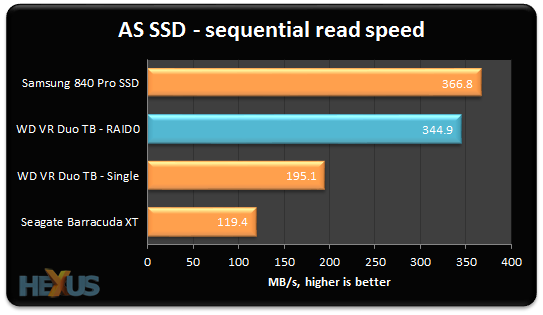
Straight-line performance is undeniably impressive in the sequential read test. Two drives almost match the throughput of the Samsung 840 Pro SSD, while a single drive is handily faster than the 3.5in Barracuda XT.
We also connected the various drives up via good ol' SATA, representing what we believe to be the gold standard. Here, the Samsung scores 520MB/s, the VR Duo 365MB/s, a single drive 196MB/s, and the Barracuda 122.1MB/s.
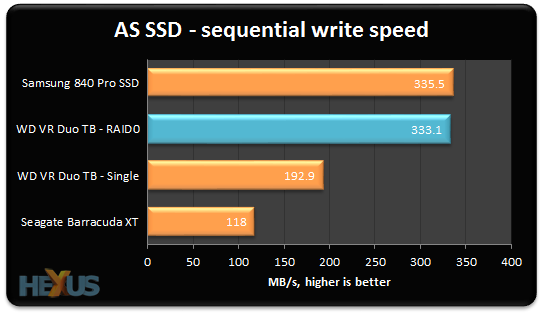
The Thunderbolt-interfacing sequential read throughput is also heady for a non-SSD (albeit expensive) solution. Connecting via SATA provides 450MB/s for the Samsung 840 Pro, 352MB/s for the two-drive VR Duo, 194MB/s for the single drive, and 119MB/s for the large-capacity Barracuda.
4K throughput
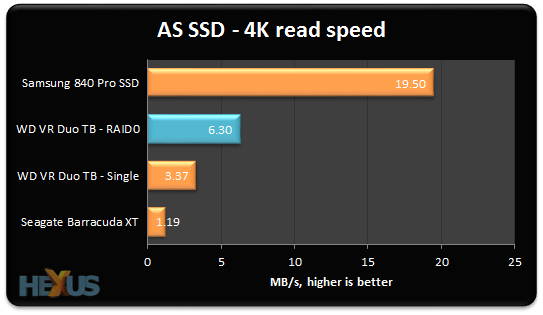
It's perhaps unfair to compare the VR Duo to an SSD, especially with 4K tests, but it's a test that shows just why the solid-state form factor is the future. Also, while the mechanical drives' 4K speed doesn't improve much when connected via SATA, the SSD jumps to 32.8MB/s.
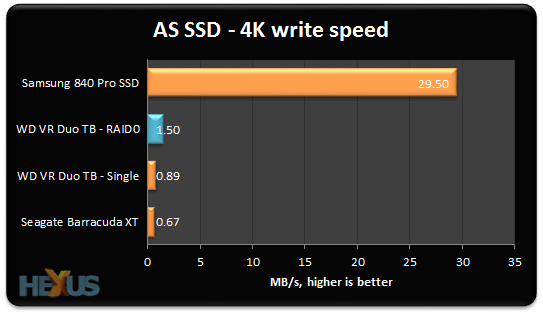
And the 4K write speed really hurts spinning disks. Again, there's not much gain when we hook them up directly via SATA, but the SSD's score soars to 68.4MB/s. If your workload requires ultra-quick access to small files, more so if the search is random in nature, the only way to go is SSD.
Real-world throughput
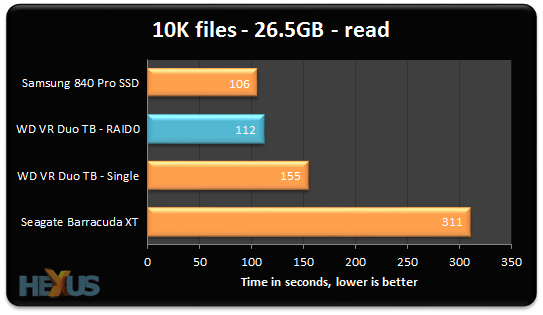
In the final test we move a Steam folder to-and-fro a host PC containing a Samsung 830 SSD. 26.5GB in size and containing 10,008 files, the transfer is a good proxy for the kind of data movements we expect users of this kind of storage to engage in.
Setup in RAID0 the VR Duo gives a good account of itself, completing the transfer back to the host PC in under two minutes. This time drops by three seconds when connected via SATA, though the SSD's time is reduced from 106s to 90s when also cabled up to SATA 6Gbps.
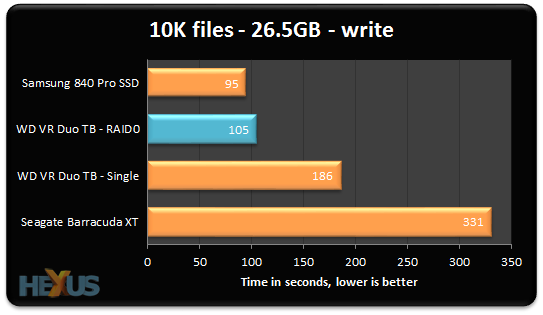
Interestingly, writing to the drives is faster for both the VR Duo (two drives) and Samsung 840 Pro, but slower for the two single drives. We guess the write speed of the Samsung 830, the host drive, inhibits ultimate performance in the first transfer graph.
But as fast as Thunderbolt is, connecting via - you guessed it - SATA reduces total time to 101s for the VR Duo and down to just 78s for the 840 Pro.
Power
The VR Duo idles at 11W when plugged in without the Thunderbolt cable attached. This figure rises to 15W once connected to a PC and 17/18W when both drives are being written to at full speed.









